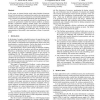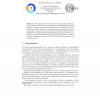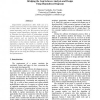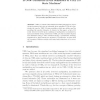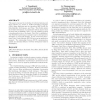93
Voted
ICCAD
1999
IEEE
15 years 5 months ago
1999
IEEE
In this paper, an internal design model called FunState (functions driven by state machines) is presented that enables the representation of different types of system components a...
98
Voted
AMAST
2000
Springer
15 years 5 months ago
2000
Springer
The behavior of reactive systems is typically speci ed by state machines. This results in an operational description of how a system its output. An alternative and more abstract ap...
98
Voted
ICALP
2003
Springer
15 years 6 months ago
2003
Springer
Abstract. Hierarchical and recursive state machines are suitable abstract models for many software systems. In this paper we extend a model recently introduced in literature, by al...
104
Voted
FASE
2003
Springer
15 years 6 months ago
2003
Springer
Scenarios are powerful tools to model and analyze software systems. However, since they do not provide a complete description of the system, but just some possible execution paths,...
ERSHOV
2003
Springer
15 years 6 months ago
2003
Springer
The article presents an approach to model based testing of complex systems based on a generalization of finite state machines (FSM) and input output state machines (IOSM). The app...
103
Voted
ERLANG
2003
ACM
15 years 6 months ago
2003
ACM
We present an implemented technique for generating test cases from state machine specifications. The work is motivated by a need for testing of protocols and services developed b...
QSIC
2003
IEEE
15 years 6 months ago
2003
IEEE
The Abstract State Machine Language supports use-case oriented modeling in a faithful way. In this paper we discuss how the AsmL test tool, a new component of the AsmL tool environ...
112
Voted
SERA
2005
Springer
15 years 6 months ago
2005
Springer
Requirements specifications often make use of a number of scenarios that are interrelated and that depend on each other in many ways. However, they are often treated separately, o...
103
click to vote
ICFEM
2005
Springer
15 years 6 months ago
2005
Springer
Abstract. UML 2.0, which is the standard modeling language for objectoriented systems, has only an informally given semantics. This is in particular the case for UML 2.0 state mach...
116
click to vote
VALUETOOLS
2006
ACM
15 years 6 months ago
2006
ACM
This paper proposes the modeling of technical systems and their behavior by means of Unified Modeling Language (UML) State Machines and the extending UML Profile for Schedulabil...
